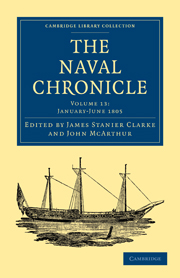 The Naval Chronicle
The Naval Chronicle Book contents
- Frontmatter
- PLATES IN VOLUME XIII. From Original Designs
- PREFACE TO THE THIRTEENTH VOLUME
- BIOGRAPHICAL MEMOIR OF LIEUTENANT WILLIAM HUNTER, OF GREENWICH HOSPITAL: An intimate Friend of the Poet FALCONER
- BIOGRAPHICAL MEMOIR OF THE LATE COMMODORE SIR WILLIAM JAMES, BART. IN THE HON. EAST INDIA COMPANY'S SERVICE, Chairman of the Court of Directors, &c
- BIOGRAPHICAL MEMOIR OF PHILIP D'AUVERGNE, DUKE OF BOUILLON, COMMODORE IN HIS MAJESTY'S SERVICE, &c. &c
- BIOGRAPHICAL MEMOIR OF ADMIRAL SIR RICHARD ONSLOW, BART
- BIOGRAPHICAL MEMOIR OF SIR RICHARD BICKERTON, BART. AND K.C. REAR-ADMIRAL OF THE RED SQUADRON
- BIOGRAPHICAL MEMOIR OF RICHARD RODNEY BLIGH, ESQ, ADMIRAL OF THE BLUE SQUADRON
- BIOGRAPHICAL MEMOIR OF RICHARD RODNEY BLIGH, ESQ. ADMIRAL OF THE BLUE SQUADRON
- INDEX
- I SPANISH NAVAL STATE PAPERS
- II SPANISH NAVAL STATE PAPERS
BIOGRAPHICAL MEMOIR OF SIR RICHARD BICKERTON, BART. AND K.C. REAR-ADMIRAL OF THE RED SQUADRON
Published online by Cambridge University Press: 10 January 2011
- Frontmatter
- PLATES IN VOLUME XIII. From Original Designs
- PREFACE TO THE THIRTEENTH VOLUME
- BIOGRAPHICAL MEMOIR OF LIEUTENANT WILLIAM HUNTER, OF GREENWICH HOSPITAL: An intimate Friend of the Poet FALCONER
- BIOGRAPHICAL MEMOIR OF THE LATE COMMODORE SIR WILLIAM JAMES, BART. IN THE HON. EAST INDIA COMPANY'S SERVICE, Chairman of the Court of Directors, &c
- BIOGRAPHICAL MEMOIR OF PHILIP D'AUVERGNE, DUKE OF BOUILLON, COMMODORE IN HIS MAJESTY'S SERVICE, &c. &c
- BIOGRAPHICAL MEMOIR OF ADMIRAL SIR RICHARD ONSLOW, BART
- BIOGRAPHICAL MEMOIR OF SIR RICHARD BICKERTON, BART. AND K.C. REAR-ADMIRAL OF THE RED SQUADRON
- BIOGRAPHICAL MEMOIR OF RICHARD RODNEY BLIGH, ESQ, ADMIRAL OF THE BLUE SQUADRON
- BIOGRAPHICAL MEMOIR OF RICHARD RODNEY BLIGH, ESQ. ADMIRAL OF THE BLUE SQUADRON
- INDEX
- I SPANISH NAVAL STATE PAPERS
- II SPANISH NAVAL STATE PAPERS
Summary
“Hereditary worth adorns his brow.”
Anon.Sir Richard Bickerton, the Father of the Gentleman whose professional life we are about to trace, was an Officer of distinguished merit in the British Navy At a future period, we indulge the hope of being enabled to present a detailed account of his services; but, for the present, we shall content ourselves with exhibiting a brief sketch, by way of introducing the Naval Career of his Son to public notice.
Mr. Bickerton, the late Admiral, having been educated at Westminster School, entered into the Royal Navy, and received his Commission as Lieutenant in the month of February, 1745-6. In 1759 he was rated Post in the Culloden, and immediately afterwards sailed for the West Indies, in the Glasgow, of 20 guns. Having displayed much activity and gallantry in that quarter, he returned to Europe in 1761, and served for some time on the Home Station. In 1767 he again proceeded to the West Indies, in the Renown, a Fifth Rate; but quitting that Ship before the conclusion of the following year, he remained unemployed till the end of the year 1770, when, on the apprehended rupture with Spain, he was appointed to the Marlborough, of 74 guns, in which he remained for three years.
When the King reviewed the Fleet at Portsmouth, in 1773, Captain Bickerton had the honour of steering His Majesty's Barge, on which occasion he received the honour of Knighthood on board of the Barfleur.
- Type
- Chapter
- Information
- The Naval ChronicleContaining a General and Biographical History of the Royal Navy of the United Kingdom with a Variety of Original Papers on Nautical Subjects, pp. 337 - 424Publisher: Cambridge University PressPrint publication year: 2010First published in: 1805


